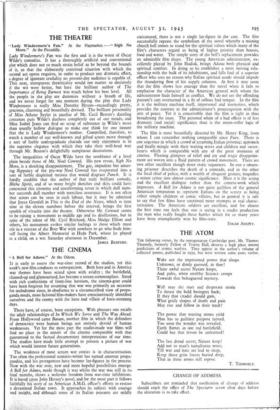THE CINEMA
"A Bell for Adano." At the Odeon.
IT is early to assess the war-time record of the studios, yet this week's new film conduces to retrospection. Both here and in America war themes have been seized upon with avidity ; the battlefield, cleaned-up and glamourised, has become a screen commonplace. Sated with rich confections of front-line heroism, the cinema-goer could have been forgiven for assuming that war was primarily an occasion for melodrama since, in obedience to a circumscribed view of propa- ganda needs, most fictional film-makers have conscientiously identified ourselves and the enemy with the hero and villain of barn-storming days.
There have, of course, been exceptions. With pleasure one recalls the adult relationships of In Which We Serve and The Way Ahead. From Hollywood came Bataan, another film in which the defenders of democracy were human beings not entirely devoid of human weaknesses. Yet for the most part the studio-made war films will find no place in the annals of the cinema comparable with that guaranteed to the factual documentary interpretations of our time. The studios have made little attempt to present a picture of war which would interest future generations.
The weakness of most screen war stories is in characterisation. Too often the professional scenario-writer has turned amateur propa- gandist, and his protagonists have become lay-figures in the process. Now with the war over, new and more hopeful possibilities emerge. A Bell for Adano, made though it was whilst the war was still in its. final months, shows a welcome freedom from war-time inhibitions. It is based upon John Hersey's novel, and for the most part it follows faithfully his story of an American A.M.G. officer's efforts to restore a devastated Italian town. It approaches its subject with courage and insight, and although some of its Italian peasants are mildly caricatured, there is not a single lay-figure in the cast. The film successfully repeats the symbolism of the novel whereby a missing church bell comes to stand for the spiritual values which many of the film's characters regard as being of higher priority than houses, food and water. The simple story of the bell's replacement provides an admirable film shape. The young American administrator, ex- cellently played by John Hodiak, brings Adano both physical and spiritual comfort. In doing so he establishes a most moving rela- tionship with the bulk of its inhabitants, and falls foul of a superior officer who sees no reason why Italian spiritual needs should impede the thundering flow of his supply columns. At first it may seem that the film shows less courage than the novel when it fails to emphasise the character of the American general with whom the administrator finds himself in conflict. We do not see the offending peasant's cart overturned in a fit of callous bad temper. In the film it is the military machine itself, impersonal and insensitive, which provides the contrast to the administrator's preoccupation with the arts of peace. Yet it is conceivable that the film is right in thus broadening the issue. The personal whim of a bad officer is of less dramatic (and social) significance than is the steam-roller logic of the military machine.
The film is most beautifully directed by Mr. Henry King, from whom I can remember nothing comparable since Fury. There is one sequence in which a crowd of returning Italian prisoners approach and finally mingle with their waiting wives and children and sweet- hearts which is comparable with any of the great moments of cinema. Fleeting glimpses of relief and joy and tragic disappoint- ment are woven into a fluid pattern of crowd movement. There are two other excellent though more static sequences. In one a return- ing prisoner describes the death of a comrade, and in the other the local chief of police, with a wealth of eloquent gesture, magnifies a minor crime into almost cosmic significance. Here it is the acting and the excellent dialogue rather than the camera-work which impresses. A Bell for Adano is not quite guiltless of the general American temptation to represent Italians on the screen as being either simple• children or comic villains, but in general it is safe to say that few films have contained more attempts at real charac- terisation. The American soldiers are excellent, and for almost the first time one feels that one is seeing in a studio production the men who really fought those battles which for so many years have been triumphantly won by film-stars.
EDGAR ANSTEY.


























 Previous page
Previous page